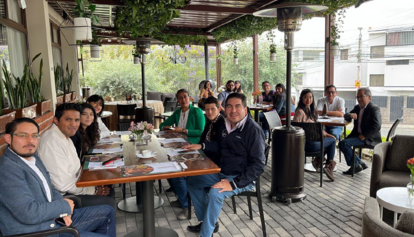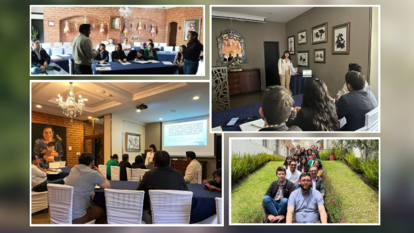Training Programs
Journalism in contexts of violence

The project is framed within the Ecuadorian context and aims to develop more training spaces for journalists and communicators at a national and international level, strengthening knowledge about international concepts and standards regarding freedom of expression, freedom of the press, the right to social protest, and the state's obligations concerning security and rights protection. The workshop included virtual and in-person courses with corresponding evaluations and certification for participants who successfully completed the program.

Workshop in Riobamba
On Saturday, October 28, Fundamedios and the Friedrich Naumann Foundation held the workshop "Secure Journalism in Contexts of Violence" in Riobamba, targeting journalists and students. The event received support from the National Federation of Journalists (FENAPE) and the Chimborazo College of Journalists. Around 30 journalists from the Andean region of Ecuador were able to firsthand familiarize themselves with international legislation on the subject. They delved into the guarantees provided by the Reformative Law to the Organic Law of Communication, from November 2022, which created the Mechanism for Prevention and Protection of Journalistic Work. Its regulations were issued last August 2023. This Mechanism involves implementing prevention, protection, and ensuring justice for cases where journalists' rights are at stake.
Maria Amelia Espinosa, Coordinator of the Protection Area, and Dagmar Flores, Monitoring Coordinator of Fundamedios, led the workshop, emphasizing international standards that must ensure the exercise of freedom of expression, press freedom, and related rights, as derived from the Universal and Inter-American Systems for the Protection of Human Rights. They also covered self-protection measures for journalistic coverage in the current context of violence.
Workshop conclusions
During the post-workshop listening session, concerns were raised about the systematic barriers to accessing public information imposed by the Municipality of Riobamba. Additionally, journalists highlighted that municipal authorities constantly delegitimize their work. They expressed worries about the increasing risks in journalistic work, leading to self-censorship due to the sensitive nature of the information they handle and the lack of guarantees for its dissemination in a context of growing threats. The Chimborazo College of Journalists pointed out a significant statistic: 70% of communication graduates do not practice their profession due, among other reasons, to job precariousness.

Workshop in Latacunga
In the city of Latacunga, on November 25, Fundamedios conducted a second workshop on secure journalism in contexts of violence, supported by the Cotopaxi College of Journalists and the National Federation of Journalists of Ecuador. The workshop delved into international treaties and standards on human rights for exercising freedoms of expression, the press, and related rights. It discussed the importance of the recent institutionalization of the state Mechanism for Prevention and Protection of Journalistic Work. Focus was also given to self-protection and protection measures to ensure safe coverages. Practical exercises on risk analysis that communication workers should perform before each coverage were conducted. The importance of media having internal protocols for safeguarding coverage work on the ground was explained.
Workshop conclusions
Following the workshop, there was an open listening session among the presenters, journalists, and students. Concerns were expressed about job precariousness, particularly focusing on young interns. There was a discussion about the confusion between the roles of journalists and content generators, and how the latter might diminish society's right to be critical and make informed decisions. Participants emphasized the need to be more creative without compromising journalistic quality. This meeting strengthened knowledge in human rights and safe coverages and provided a space for the exchange of ideas between professionals and the new generation of communicators. The initiative reflected a continuous commitment to the training and protection of those seeking to inform with integrity in increasingly challenging environments. The event also had the presence of educators, who showed particular interest in the contributions academia should provide to train journalists and committed communicators focusing on ethics, research work security, and sustaining democracy.